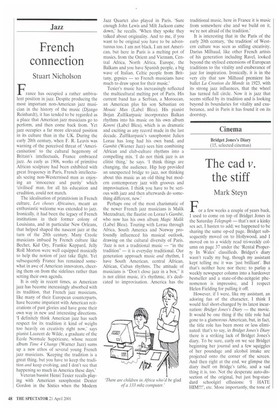French connection
Stuart Nicholson
France has occupied a rather ambivalent position in jazz. Despite producing the most important non-American jazz musician in the history of the music (Django Reinhardt), it has tended to be regarded as a place that American jazz musicians go to perform, and then come back from. Yet jazz occupies a far more elevated position in its culture than in the UK. During the early 20th century, when F. R. Leavis was warning of the perceived threat of 'Americanisation' to the cultural hegemony of Britain's intellectuals, France embraced jazz. As early as 1906, works of primitive African sculpture had been exhibited with great frequency in Paris, French intellectuals seeing non-Westernised man as enjoying an 'innocence and purity' which 'civilised' man, for all his education and erudition, could not match.
The idealisation of primitivism in French culture, Les choses Africaines, meant an enthusiastic welcome was extended to jazz. Ironically, it had been the legacy of French institutions in their former colony of Louisiana, and in particular New Orleans, that helped shaped the nascent jazz at the turn of the 20th century. Many Creole musicians imbued by French culture like Bechet, Kid Ory, Frankie Keppard, Jelly Roll Morton were well equipped musically to help the notion of jazz take flight. Yet subsequently France has remained somewhat in awe of American innovators, cheering them on from the sidelines rather than setting their own agenda.
It is only in recent times, as American jazz has become increasingly absorbed with its tradition, that French jazz musicians, like many of their European counterparts, have become impatient with American reiterations of past glories and have gone their own way in new and interesting directions. 'I definitely think American jazz has such respect for its tradition it kind of weighs too heavily on creativity right now,' says pianist Laurent de Wilde, a graduate of the Ecole Normale Superieure, whose recent album Time 4 Change (Warner Jazz) sums up a new ethos of several young French jazz musicians. 'Keeping the tradition is a great thing, but you have to keep the tradition and keep evolving. and I don't see that happening so much in America these days.'
Veteran bassist Henri Texier recalls playing with American saxophonist Dexter Gordon in the Sixties when the Modern Jazz Quartet also played in Paris. 'Sure enough John Lewis and Milt Jackson came down,' he recalls. 'When they spoke they talked about originality. And to me, if you want to be original you have to be adventurous too. I am not black, I am not American, but here in Paris is a melting pot of musics, from the Orient and Vietnam, Central Africa, North Africa, Europe, the Balkans and you have Spanish people, a big wave of Italian, Celtic people from Brittany, gypsies — so French musicians have much to draw upon for their music.'
Texier's music has increasingly reflected the multicultural melting pot of Paris. His current band has a Serbian, a Moroccan, an American plus his son Sebastian on Mosaic Man (Label Bleu). His pianist Bojan Zulfikarpasic incorporates Balkan rhythms into his music on his own album Koreni (Label Bleu), which is as dramatic and exciting as any record made in the last decade. Zulfikarpasic's saxophonist Julien Lorau has long had his own band, and Gambit (Warner Jazz) sees him combining African and club-culture rhythms into a compelling mix. 'I do not think jazz is an elitist thing,' he says. 'I think things are changing, the audience. Hip hop provided an unexpected bridge to jazz, not thinking about this music as an old thing but modern contemporary jazz with grooves and improvisation. I think you have to be serious with jazz and then afterwards do something different, new.'
Perhaps one of the most charismatic of the newer French jazz musicians is Malik Mezzadrazi, the flautist on Lorau's Gambit, who now has his own album Magic Malik (Label Bleu). Touring with Lorau through Africa, South America and Norway profoundly influenced his musical outlook, drawing on the cultural diversity of Paris. 'Jazz is not a traditional music — "in the tradition" — it is everyday traditional. Our generation approach music and rhythm, I have South American, central African, African, Cuban rhythms. The attitude of musicians is "Don't close jazz in a box." it is not elitist music, it's rhythmic, it's dedicated to improvisation. America has the
traditional music, here in France it is music from somewhere else and we build on it, we're not afraid of the tradition.'
It is interesting that in the Paris of the early 20th century, 'the tradition' of Western culture was seen as stifling creativity. Darius Milhaud, like other French artists of his generation including Ravel, looked beyond the stylised extensions of European traditions to the vitality and exuberance of jazz for inspiration. Ironically, it is in the very city that saw Milhaud premiere his ballet La Creation du Monde in 1923, with its strong jazz influences, that the wheel has turned full circle. Now it is jazz that seems stifled by its tradition and is looking beyond its boundaries for vitality and exuberance, and in Paris it has found it on its doorstep.


































































 Previous page
Previous page